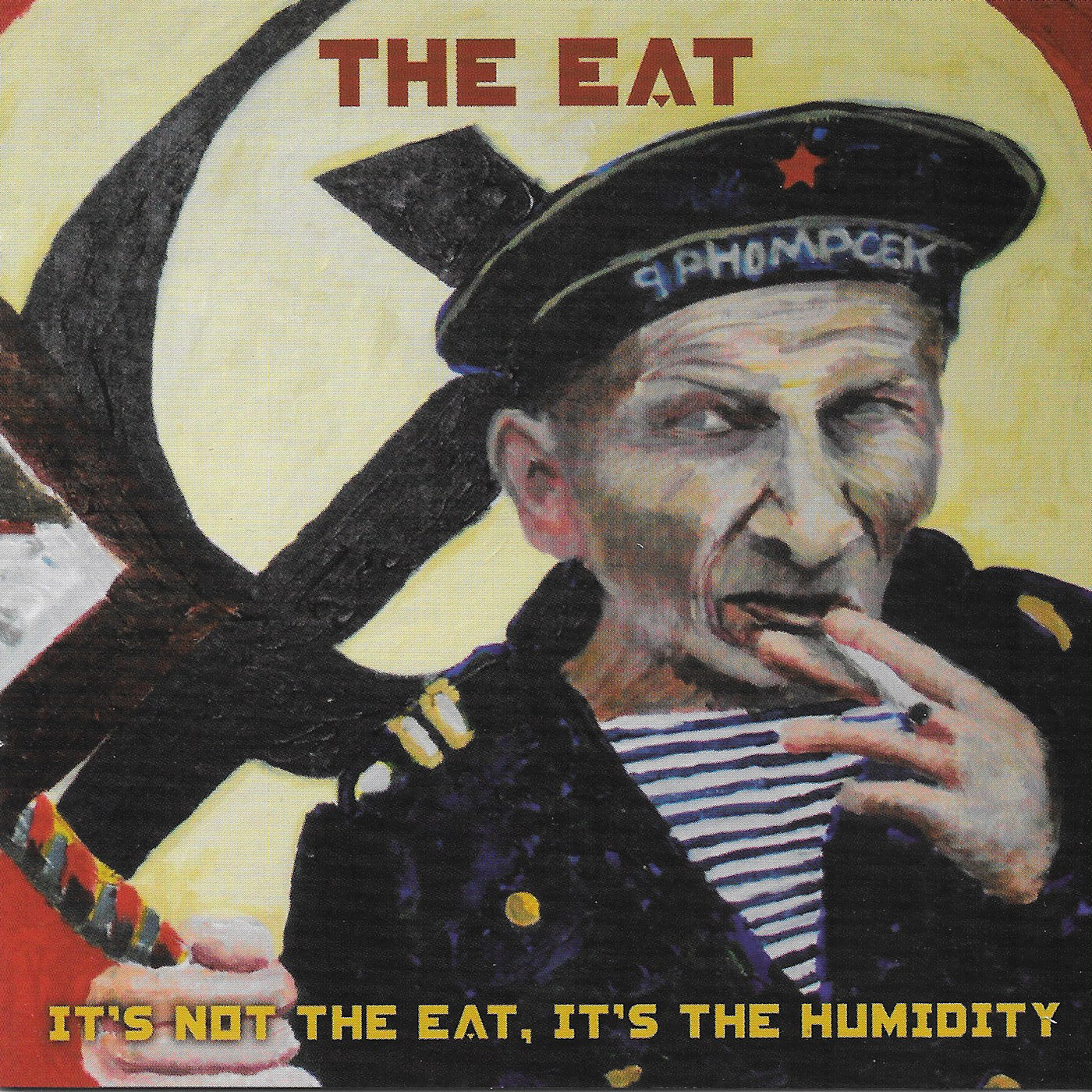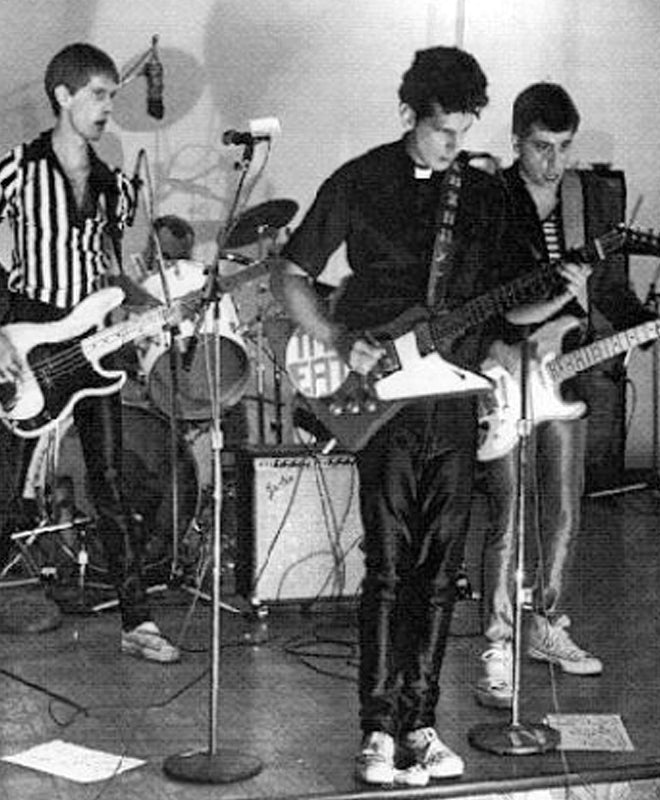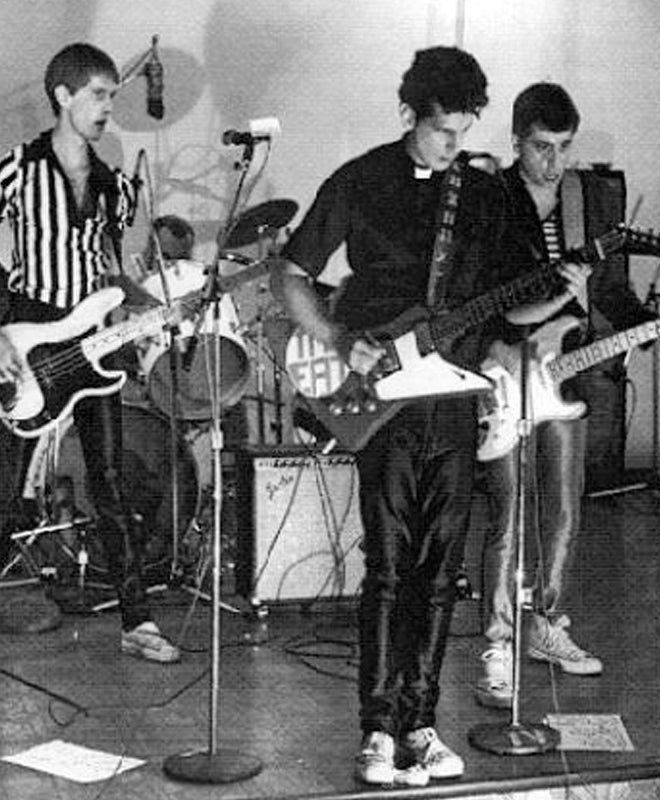Bio
Formed in 1978 by brothers Eddie and Michael O’Brien, Glenn Newland, and Christopher Cottie, The Eat rapidly became a distinct member of a relatively small group of South Florida punk rock acts that also included the Cichlids. The same thing was happening all around the country; young kids everywhere were rejecting the disco and track music stagnation of Seventies radio. Armed with deceptively simple songs, The Eat gigged on a small circuit of clubs throughout South Florida — The Agora Ballroom, Flynn’s, The Premier AOR, Balkan Lounge, and 27 Birds, just to name a few. “In the early Seventies, doing original material in clubs was out of the question,” says Eddie O’Brien. “Maybe you could slip in one per set, but the clubs sometimes even told you what covers you could play. The Cichlids were the first popular band I remember doing originals … and they kicked the door open for us, [Charlie] Pickett, The Reactions, and the others.”
Utilizing what little money they had made from their concerts, the band quickly put together a seven-inch single in 1979, the legendary “Communist Radio” backed with “Catholic Love,” on their own label, Giggling Hitler Records. Chronologically, it was the second punk record issued out of Miami (the first being Critical Mass’s single “Silver Screen,” which was released in 1978). It treated listeners to what Pickett describes as Eddie’s “black Irish humor.” “I remember sitting with [local bassist and soon-to-be Eat member Kenny Lindahl] with our mouths open, thinking, How could anyone be so smart and so normal at the same time?” says local guitar legend Pickett. “The Eat were the most intellectual, most eclectic, and at the same time easiest to love band; you didn’t have to put on your Captain Beefheart hat to understand them.”
The Eat’s sound was reminiscent of Fifties rock and roll dipped in an amphetamine bath. The O’Brien brothers’ driving guitars flanked an incredibly tight and powerful rhythm section. Eddie’s guitar work twanged vestigial, his rockabilly/country/psych influences tug-o-warring with younger Michael’s metallic punk licks. Newland’s bass acted as a clarifying metronome to the sonic sibling rivalry, while Cottie generated a booming, steady beat that grounded the rock and roll monster. Even in the lo-fi quality of the “Communist Radio” single, Eddie’s delivery of a line like “I learned my Latin up in Manhattan/And I’ve brought it down South to you” is bound to make you hum.
The five-song EP, God Punishes The Eat, was released in 1980. Allegedly the band recorded it during days 98 through 123 of the Iranian hostage crisis on a four-track recorder in Eddie’s basement. Its cover illustration — Miami’s downtown skyline being demolished by lightning and brimstone — is a classic punk rock image. God Punishes The Eat’s subject matter was a reflection of the times: the Mariel boatlift, corrupt cops, and drugs. “Nut Cop” best displays their never-ending struggle between debauchery and a Catholic upbringing: “I’m gonna tell ya what the jury said/Ten Hail Marys and I’ll see you on Tuesday/One for your mother, one for the Pope/Eight for policemen selling you dope.”
By 1982, the band had enough material and chemistry as a unit to invest in a slightly higher fidelity recording. The result was the extremely rare cassette Scattered Wahoo Action, released on Broward County’s now-defunct Jeterboy Records. It was fueled by the same energy of their first two releases, while displaying newfound creativity and range, thanks to Cottie’s keyboards and the quirky saxophone performance of longtime friend Dirk Bill on the neo-funky “Nixon’s Binoculars,” an acid-constructed venture poking fun at the Watergate scandal. The track “She’s Pissed Off” came from an offhand remark by a fan concerning a friend of hers: “Oh, she’s pissed off ’cause my brother wouldn’t fuck her.”
Unfortunately, Eddie’s personal life (married since 1974, his first son was born in 1982) prevented him from aggressively pursuing band business. Newland had already split by 1981, and was replaced by Lindahl. By the time Scattered Wahoo Action hit stores, The Eat’s progress had slowed considerably. In lieu of family and outside interests, their live appearances gradually stopped. Their place in Miami rock history, however, was secure.
“The Eat were one of the first and most important punk bands in the state of Florida,” says Bob Suren, musician, archivist/collector, and owner of the Sound Idea record store in Brandon. “They inspired the first wave of Florida hardcore, bands like F, Roach Motel, Lethal Yellow, and Gay Cowboys in Bondage. Without The Eat, hardcore and punk would have not developed here.”
Years after winning accolades in fanzines, most notably in San Francisco’s Maximum Rock’n’Roll, The Eat’s small discography is prized by collectors around the world. Original copies of “Communist Radio” have fetched anywhere between $200 and $650 through online auctions and record swaps. Anybody who read Maximum Rock’n’Roll in the early Nineties probably remembers a guy in some Scandinavian country who ran a scam, promising a mint copy of “Communist Radio” for $125 plus shipping and handling. After a few irate punks shelled out $125 and never received the record, the editors pulled the ad from the zine’s pages.
The Eat even drew a famous supporter, Jello Biafra. His love of the band led him to broker a deal with the Dutch record label Wicked Witch, which re-pressed Scattered Wahoo Action as a ten-inch vinyl EP in 1996. This edition excluded the slow versions of “Catholic Love,” “The Car,” and “Subhuman,” (the last of which Wicked Witch would later make available on the split seven-inch compilation, Kangaroo vs. Wicked Witch: Co-operation, Not Competition). Additions to the rerelease included “One Call to Cuba” and a great live version of “Communist Radio.” The Scattered Wahoo Action rerelease coincided with the premiere of a newly recorded seven-inch, “Hialeah,” for Jeterboy.
In 1996, The Eat performed a raucous set at Churchill’s Pub. Well-rehearsed and firing off songs with intensity, the O’Briens, Cottie, and Lindahl played like fellows half their age who had never stopped gigging. Two years later, on July 11, that line-up appeared together at Churchill’s for the last time to play a short set at a memorial show for Pete Moss, a beloved local scenester who’d played in a dozen bands (including Gay Cowboys in Bondage and Spanish Dogs) since the late Seventies.
On June 6, 2004, Cottie passed away. The drummer performed on the South Florida bar circuit for decades, earning enough cred to play in the country/psych band Helios; Icarus, a quasi-classic rock band from Nova Scotia; and with the late David Allen Coe (of “Take This Job and Shove It!” fame). “The best drummer I ever played with,” says Lindahl. “He didn’t just keep time, he wrote songs, and contributed greatly to the band.” But Cottie did more than just play punk rock. In the mid-Eighties, he received his bachelor’s degree and teaching certificate from Barry University in Miami Shores, then his master’s degree in counseling from St. Thomas University in Miami Gardens. He had been on sick leave from the Robert Renick Educational Center in Opa-locka, where he worked as a guidance counselor, and had been planning to have bariatric surgery when he suddenly died. The giant who wrestled with weight issues throughout his life will be remembered for his powerhouse drumming and his big heart.
[From a Miami New Times 2004 article by Abel Folgar.]
Releases
 v377 - The Eat - "It's Not The Eat, It's The Humidity"
v377 - The Eat - "It's Not The Eat, It's The Humidity"v377 - The Eat - "It's Not The Eat, It's The Humidity"
Regular price $30.00 USDRegular priceUnit price / per$30.00 USDSale price $30.00 USD



